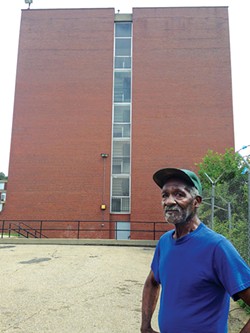On a hot and sticky Saturday morning, the East Liberty Lutheran Church was jam-packed with soon-to-be-evicted residents of the Penn Plaza Apartments. Everyone was sweating and many were fanning themselves with pamphlets with the words "Black Homes Matter" written across the front in bold letters.
Residents of the East Liberty apartment complex had been given 90-day eviction notices two to three weeks previously, with some of them effective at the end of July. After community outcry, Mayor Bill Peduto's office got the owners to agree to a 60-day stay on the evictions. But while the residents now have a bit more time, and some politicians in their corner, the issues of affordable housing and the displacement of low-income residents are far from fixed.
"This is not happening in isolation. Involuntary displacement of folks of color out of the city is a recurring trend," says Bill Bartlett of Action United, an advocacy group that has taken up the Penn Plaza residents' cause.
The last time a mass eviction this large occurred in East Liberty was the felling of the high-rises known as East Mall, at Penn Circle and Liberty Park, in the mid 2000s. There were 519 units total in those buildings; some residents were relocated to newly constructed affordable housing, but many remained displaced and were forced to move out of the neighborhood. Ninety-five percent of the high-rises' occupants were African Americans, according to a Federal American Properties occupancy index acquired by City Paper.
The difference there, however, was that the removal of the high-rises had some community support and was accompanied by a plan to alleviate some of the displacement. State Rep. Ed Gainey says he found out about the Penn Plaza evictions only after numerous residents called his office, and that the owners haven't spoken to anyone in the community about what will come next.
Penn Plaza management did consider the hardships of their residents a little: At the end of its eviction notices, residents were reminded to "have a nice day."

When 76-year-old Uyless Sample was given his 90-day eviction notice at the 5600 Penn Ave. building of Penn Plaza, he walked across the street to New Pennley Place and was told the waiting list for a subsidized apartment was five years.
"I think it is full of shit. Everybody is trying to find a place to live," says Sample. "I got applications in just about every place around here."
Sample, a veteran who served after the Korean War, pays $262 in rent for his Penn Plaza apartment. If he is not able to find subsidized housing, he is looking at an average rent of $991 in East Liberty, according to May 2015 numbers from rentjungle.com, a Pittsburgh-based apartment-search site.
Forty-one households within the 312-unit Penn Plaza complex will be scouring East Liberty for Section 8 affordable housing, a near-impossible task considering the length of waiting lists at local subsidized housing complexes.
Additionally, not all property owners accept Section 8 tenants. And finding one who does probably means relocating to a town outside the city, such as Clairton or Duquesne. Moreover, East Liberty's current overall vacancy rate is 1 percent, according to Kendall Pelling, a staffer with East Liberty Development Inc. (ELDI), a nonprofit whose mission is to foster revitalization of the community.
But Section 8 residents aren't the only ones who will be battling a tiny vacancy rate to stay in East Liberty. Residents estimate that there are around 500 people living in Penn Plaza. Rates for a one-bedroom apartment are around $680 a month, which is below market these days for a decent place in East Liberty within walking distance of transit, shops and restaurants.
Randall Taylor, a former Pittsburgh school-board representative and current Penn Plaza resident, says that the building is filled with hundreds of non-Section 8 residents, such as students and professionals of varying backgrounds.
"These buildings are not only Section 8," says Taylor. "These are working, tax-paying people. This building meets their lifestyle."
The large Penn Plaza lot on Penn Avenue, between Negley and Euclid avenues, has been owned by the Gumberg family, or LG Realty Advisors, since 1966, when they purchased it from the city's Urban Redevelopment Authority (URA). The initial mortgage was financed through the Federal Housing Administration (FHA), which provided a government-funded safety net against losses as the result of homeowners defaulting on their mortgage loans.
While carrying this mortgage, the owners were subject to an FHA agreement that states that the owner shall make dwellings available to occupants at charges not exceeding those established by the FHA commissioner. Penn Plaza spent more than 30 years as a federally regulated, rent-controlled residence.
However, once its mortgage was paid off — around 2000, according to U.S. Dept of Housing and Urban Development Pittsburgh Office Director Jane Miller — its owners were no longer subject to those requirements.
Today, after weeks of uncertainty about the buildings' future, Mayor Peduto says that LG Realty plans to renovate the property as a mix of retail and housing.
"We have been in discussion with the owner," says Kevin Acklin, Peduto's chief of staff. "We want to ensure the project will move forward in a manner that addresses the future of affordable housing in East Liberty."
ELDI's Pelling says that any major changes to the structures would have to go through a public process. Most of the 140 residents who attended the Saturday meeting voted unanimously to form a tenant council. That means they will have organized representation before city officials, which could make major changes to the site contentious.
Peduto told City Paper that after redevelopment, the Penn Plaza residents would be given priority to access affordable units. But in the meantime, there is nowhere for them to stay in East Liberty, given that thousands of people are already waiting to find affordable units there.
The Coalition of Organized Residents of East Liberty states that over the past 15 years, 764 subsidized units have been lost. However, ELDI says that over the past decade, hundreds of new subsidized units have been added in the community, for a current total of 694.
Accounting for the 41 threatened affordable units at Penn Plaza, it seems likely that East Liberty has hundreds fewer affordable units than it did 15 years ago. (That total doesn't include Penn Plaza's other 271 nonsubsidized units with below-market rents.)
Pelling says future ELDI projects will create from 120 to 130 new affordable units in the neighborhood, but that still leaves a significant affordable-housing gap.
"We cannot afford to lose that many units. We want the Gumbergs to hold off on their plans," says ELDI Executive Director Maelene Myers. "My preference is to keep those families in their homes. If they do not maintain affordable housing, we got a major community fight on our hands."
Understandably, the residents want to stay in Penn Plaza. Taylor hopes that some kind of tenant ownership could be worked out for at least one of the property's six buildings. (In 2008, the Northside Coalition for Fair Housing, with financing from the URA, was able to purchase more than 300 affordable units scattered throughout the North Side after a hard-fought, 10-year process.)
"We stayed here and lived through the bad — why don't we get to live through the good?" says community advocate Alethea Sims, who lived in the East Mall high-rise prior to its demolition. "Something has to be done. Low-income residents are getting pushed out in the name of progress. It has to stop."















